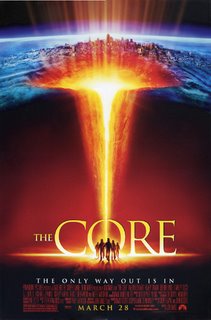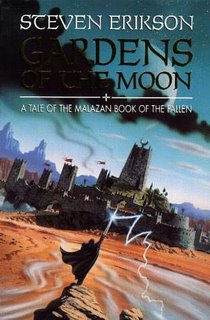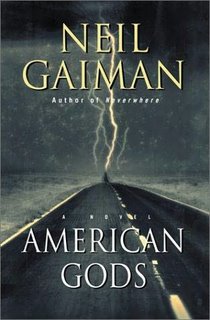Movie - The Core - Directed by Jon Amiel

I have recently begun to rent older movies which I missed in theatres.
Sadly, I have also recently begun to remember why I missed them in theatres.
The Core is a disaster movie.
No, wait... The Core is a disaster of a movie.
The 'science' used is so outlandish that a well trained chimp would see through it. The dialogue isn't any better. A complete range of stereotypes make up the crew. The emotionally intense parts are so ridiculous that they made you laugh. The special effects might have been top-of-the-line ten years ago, but, in today's climate, they look cheesy. And to finish it all off, the movie drags out far beyond the time it should. It's hard to recall another movie doing so many things wrong. Next to this, Armageddon is an example of intelligence and restraint.
The movie is in fact though, a marvel. It's so bad, it's almost entertaining. So much so that one must almost believe that director Jon Amiel sabotaged his own work, in an last ditch effort to save it.
It could also be part of why the movie was delayed... though at the time it was stated that it was sent to be re-edited to remove a scene showing a ficticious space shuttle crash, in light of NASA's own real-life space shuttle disaster.
The story is simple and has been retold several times in recent years. Bad government people have been mucking around with nature in order to develop nasty weapons of mass destruction. In this specific case, they have inadvertently stopped the planet's core from spinning, which results in a breakdown of the electromagnetic field which protects us from the sun's radiation (among other things).
Perhaps it is just the raging applied mathematician in me, but permit me if you will, to examine just one of the outlandish science ideas presented in the book: their proposed solution of burrowing to the centre of the earth and using five 200-megaton nuclear warheads to 'jump start' the core.
I won't argue the impossibility of stopping the Earth's core and will gracefully ignore the fact that the largest nuclear bomb ever built was a Russian device rated at 100 megatons and weighed a whopping 27 metric tons. I'll also merrily ignore the fact that the largest bomb currently in the U.S. arsenal is only 9 megatons. From an energy standpoint alone, five 200-megaton bombs wouldn't even come close to being able to spin a stationary inner or outer core up to full speed.
The solid iron inner core normally has a rotational kinetic energy equivalent to about 340 200-megaton bombs. The liquid metal (primarily iron) outer core surrounding the inner core has a normal rotational kinetic energy equivalent to roughly 32,000 200-megaton bombs. Assuming only the inner core had to be restarted and that 100% of each bomb's energy could be converted to rotational kinetic energy, the movie's heroes are at least 335 bombs short of the required amount.
Note that the bombs would also have to have their energy directed along a plane tangental to the earth's core for torque to be created, and I'm sure I haven't even scratched the surface (which is about all their 5 200-megaton bombs would have done).
Even Jules Verne writing well before the advent of nuclear powered submarines was closer to a realistic view of science than The Core.
On the bright side, the terranauts' ship, Virgil, is made of an impossible alloy capable of withstanding the extreme temperature and pressure found in the core. To its credit the movie calls the material unobtainium. It is perhaps one of the few glimmers that suggest that they actually knew just how bad this movie was when they were making it.




